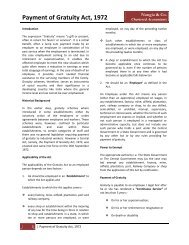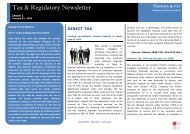DIRECT TAX - Nangia & Co
DIRECT TAX - Nangia & Co
DIRECT TAX - Nangia & Co
Create successful ePaper yourself
Turn your PDF publications into a flip-book with our unique Google optimized e-Paper software.
Tax & Regulatory Newsletter<br />
Issue 05 – AUGUST, 2010<br />
NANGIA & CO.<br />
Chartered Accountants<br />
New Delhi – Mumbai - Dehradun<br />
Since long term capital gain on transfer of shares was exempt<br />
under the Income Tax Act, the same could not be brought to tax<br />
under the MAT regime;<br />
The expression ‘company’ used in the MAT provisions was defined<br />
in the general definition section of the Indian Tax Law to mean<br />
any Indian company or a company incorporated under the laws of<br />
a country outside India, however this definition was qualified by<br />
the expression ‘unless the context otherwise requires’, therefore<br />
the use of the definition required an evaluation of the<br />
circumstances and the context in which it was to be used, which<br />
clarified that the definition meant only an Indian company;<br />
The MAT regime mandated the preparation of financial<br />
statements as per the Indian <strong>Co</strong>mpany Law which would imply<br />
that a foreign company would have to recast its global financial<br />
statements in accordance to the Indian <strong>Co</strong>mpany Law for the MAT<br />
provisions to apply and it was hence difficult to accept that the<br />
legislature intended to apply the MAT regime to foreign<br />
companies;<br />
The administrative circulars issued also indicated that the MAT<br />
rate was arrived at based on the rate applicable to domestic<br />
companies.<br />
The Authority for Advance Ruling ruled that –<br />
Application of the definition of<br />
the term ‘company’ to a foreign<br />
company without enquiring<br />
into the opening words used,<br />
i.e., ‘unless the context<br />
otherwise requires’ would<br />
make the MAT regime unworkable. Furthermore, several<br />
provisions under the Indian Tax Law were to be read together as<br />
part of a larger scheme and every clause was to be construed with<br />
reference to the context and other clauses of the Law to make a<br />
consistent enactment of the whole statute;<br />
The context of the MAT regime, the Finance Minister’s speech<br />
and the administrative circulars did indicate that the MAT regime<br />
was not designed to be applicable to a foreign company, which<br />
had no presence or a Permanent Establishment in India;<br />
The ruling in the case of P. No. 14 of 1997 (supra), relied upon by<br />
the Revenue, was rendered in a different context wherein the<br />
entity was doing business in India and also had a Permanent<br />
Establishment in India and, therefore, was required to comply<br />
with the provisions of the Indian <strong>Co</strong>mpany Law and maintain<br />
books of accounts. The applicant had no established place of<br />
business in India in the form of an office or branch or a Permanent<br />
Establishment and was therefore not required to prepare its<br />
financial statements as per the Indian <strong>Co</strong>mpany Law and hence<br />
Page | 4









